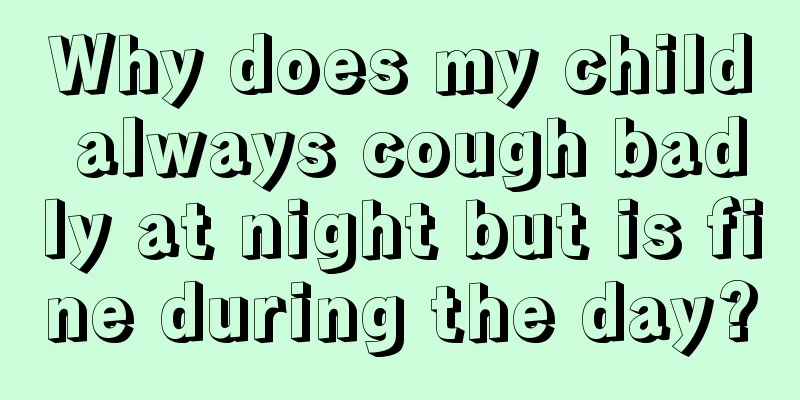Why does my child always cough badly at night but is fine during the day?

|
The child keeps coughing in the middle of the night. The child is uncomfortable, the adults are worried, and the whole family can't sleep well. Obviously, there is no allergy or cold. Why does the child keep coughing at night? Why is the cough so severe in the middle of the night, but fine during the day? If your child with coughing symptoms goes to the doctor, you will definitely be asked: Is the cough stronger during the day or at night? This question is very important because severe coughing at night is often one of the characteristics of allergic tracheitis (also known as asthma). Night coughing is really troubling for parents. In addition to waking up from the cough and affecting sleep, in severe cases, the child may cough to the point of vomiting all over the bed, making the whole family in a panic. Moreover, allergic tracheitis does not only last for one or two days, but often lasts for a month or so, making parents nervous. They always keep their ears perked up every night, fearing that their child's coughing will affect their growth and development. Postnasal drip causedIn the past, when doctors examined patients’ oral cavity, they would often see two thick snots hanging at the back of the throat after putting down the tongue depressor, and then the patient would start to cough. So the old doctors would write the words “nasal reflux” on the medical records, indicating that the patient had too much snot, which irritated the mucous membrane of the throat and trachea, causing chronic night cough. It sounds quite reasonable, especially when people lie in bed at night, in theory, the snot flows from the nasal cavity to the inside, which seems to be more likely to irritate the respiratory tract and induce coughing. However, this answer is obviously not applicable to most patients. Human nasal mucus is secreted 24 hours a day, one-third of which comes out of the nostrils and two-thirds is swallowed. In theory, if the nasal mucus is severe, it means that the nasal mucus coming out of the nostrils will not be reduced. However, everyone should have experience that when children cough at night, they may not have a lot of nasal mucus, or even no nasal mucus at all. Moreover, if nasal mucus is the main cause of night cough, then after taking antihistamines and drying up the nasal mucus, the child's cough should be relieved. But what is the result? The child still coughs all night long, and it doesn't help at all. A small conclusion is that the phlegm sound of children's night cough is almost all mucus secreted from the trachea itself, not caused by postnasal drip. There are not so many children with postnasal drip in the world, there must be other reasons for night cough. Environmental triggersThe word "allergy" means oversensitivity. The trachea of these allergic children is particularly sensitive to changes in the surrounding environment. As long as there is a slight disturbance, they will secrete a large amount of mucus as a reaction. So let's think about what changes in the air can easily make people sensitive when they sleep at night? For example, such as temperature drops, humidity changes, etc., but the most important thing is the increase in exposure to dust mites. Generally, pillows and spring mattresses are filled with human dandruff after being bought for a long time, which becomes a breeding ground for dust mites. Therefore, when children sleep on a bed without an anti-mite cover, the number of dust mites they inhale will be ten times that of ordinary air. This is the main reason why children with allergies cough at night. Sometimes the air is too dry at night due to the heating, which can also cause night coughs. However, if the heating is not turned on and the temperature is too low, it will also irritate the respiratory tract and cause coughs! Therefore, allergic trachea is quite difficult to take care of. Not only do you need to turn on the heating at night, you also need to turn on the humidifier, which is really troublesome. Biological clock influenceHowever, you may have had this experience: you don't have an allergic constitution, but even if you have a common cold, you often feel that your cough at night is particularly obvious, and you even start to produce phlegm in your trachea before you even lie down in bed, which seems to have nothing to do with dust mites. Yes, this is the second reason for night coughs that I want to share with you: the biological clock. Not only do we have a biological clock for sleep, but in fact, coughing also has a biological clock, which makes us cough more easily at night or sneeze wildly in the morning. Scientists even know that in the so-called allergic cells (we call them fat cells, but they have nothing to do with obesity), its biological clock is controlled by a certain gene, which is called Per2. In mouse experiments, if the gene responsible for the allergic biological clock is messed up, the mouse will be wildly allergic regardless of day or night, and there will no longer be a difference between day and night. Therefore, whenever it gets dark, our cough genes will start to stir. At this time, if we give steroid inhalers or nasal sprays, we can effectively delay the biological clock. This is why many maintenance drugs for allergic trachea or allergic nose only need to be used once a day. It is more effective to use them after dark than to use them in the morning. Scientists have also found that many organs in the human body, including the liver, gastrointestinal tract, heart, etc., also have mechanisms similar to the biological clock. Therefore, regular daily routines and sleep are actually very helpful for the operation of our entire body. |
<<: How to treat endometritis during pregnancy preparation
Recommend
What is the cause of the milk crust on the baby's head and how to remove it
Cradle cap is a yellow or brown scaly flake on th...
Is it better for pregnant women to sleep on the left side or the right side? Sleeping on the left side is the most comfortable
Many pregnant women often don't know which sl...
When is the best time to start postpartum exercise? What should I pay attention to when doing postpartum exercise?
Postpartum body recovery is a long and arduous ta...
What foods can’t be eaten during breastfeeding? What should I do if my baby can’t finish the milk?
Everyone should know that it is better for childr...
Pregnancy check-up time and items When does pregnancy reaction usually start?
Usually, during pregnancy, mothers need to go to ...
The most practical maternity bag comes from mother’s love
A maternity bag is something that every mother mu...
Does painless childbirth hurt? Does painless childbirth have any effect on the baby?
The popularity of painless childbirth in my count...
Which manufacturer of Shanghai sulfur soap is authentic? Which company is Shanghai sulfur soap from?
The Shanghai Sulfur Soap brand seems to have been...
How to tell if your baby has bow legs? How to do a physical examination for your baby at home?
The baby's growth stage requires our constant...
Why is it that one eye is bigger than the other? Be alert to these four possibilities
Eyes are the most important organ in the human bo...
Does watching TV affect the baby's eyes? Will watching TV cause myopia?
Does watching TV affect the baby's eyes? Many...
How can parents strengthen parent-child relationships and promote communication?
Parents have a profound influence on their childr...
How to deal with newborn bloating? 4 ways to relieve it
First, take precautions and do not feed too fast,...
How long is the best time for pregnant women to do yoga? Yoga moves that pregnant women can do
Pregnant women doing yoga is very beneficial to t...
How to get your baby to speak as early as possible
The language development progress of each infant ...









